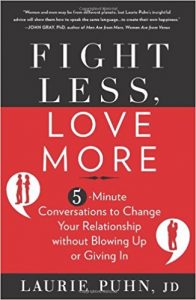“I love my husband, but I don’t like him.” That’s a comment I often hear in my couples mediation practice and as a facilitator at a Fight Less, Love More couples course. Over the years, I discovered something interesting: Many people are kinder to strangers than they are to their spouses.
The “liking” feeling often diminishes as everyday job stress, parenting decisions, financial woes and child-induced sleep deprivation take over.
When overwhelmed by life, small things may seem like “the last straw,” and you might even wonder if you are married to the right person.
People assume that as an expert I have a perfect marriage. The truth is, I do have a happy marriage and I love my husband, but still, we have our good and bad days that strain the liking feeling. Conflict is normal for all couples, but how we choose to respond to it will either strengthen or weaken the relationship.
Here’s a revealing personal story:
One day, my husband told me he’d be home from work earlier than usual.
I put his early arrival time into my afternoon schedule so my then-2-year-old son and I would be home to greet him, and enjoy some playful “Daddy time.” When my husband’s designated arrival time passed, each additional minute pushed me into a worsening mood. At 50 minutes past his planned arrival, I was furious. Why wasn’t he here? Why wasn’t he answering his cell phone?
My husband showed up more than an hour after I expected him, displaying a freshly trimmed head of hair, smiling and acting like nothing had happened.
“So you got a haircut?” I asked.
“Yes, I had time today, so I figured, why not?”
That was it. I ripped into what seemed to me to be his thoughtless selfish behavior and the fight began.
But minutes later, reality hit. In our pre-child days, I would have been more understanding and explained how I felt about his late arrival. Now, with my energy drained, I acted as if his haircut was akin to finding out he cheated on me with his hairdresser.
Our Best Selves
We are our best selves early in our relationship. We show each other empathy, respect and patience. As time passes, we come to expect those things from our spouse, but we tend to extend them less and less. Use of the words “thank you” and “please” become sparse, replaced by words like “You have to…” and “Why didn’t you…”, which are set-up comments for a fight. So what can a person say to prevent such unnecessary battles?
The answer is to stop and ask yourself one question when you feel dissatisfaction and anger erupting: “What do I want my spouse to do differently next time?” In my situation, I wanted my husband to call me in advance to tell me that his plans had changed.
As soon as I realized my short-tempered mistake, I apologized, explained that I got angry because I value our time together and had planned around his early arrival, and most importantly, I asked for what I wanted (advance notice). Interestingly, my husband was flattered to learn that I was looking forward to his coming home early. Our five-minute conversation ended with the agreement that if his plans changed, he would call immediately. So my advice for couples who want to love-and-like their mate for a lifetime is: Don’t focus on the problem. Do focus on the solution to prevent it from recurring. A little wisdom makes a big difference.
About the Author
Laurie Puhn is a Harvard-trained lawyer, couples mediator, relationship communication expert and bestselling author of Fight Less, Love More: 5-Minute Conversations to Change Your Relationship without Blowing Up or Giving In. She has partnered with Family Dynamics Institute to develop the Fight Less, Love More Course now offered throughout the United States and recommended as a resource for married couples on the USCCB website For Your Marriage. Click here for course information. Find Laurie online at fightlesslovemore.com.



 Do you and your mate get into the same arguments, time and gain? Do you encounter family members who have the uncanny ability to push your buttons and get in your face, even though you set out to steer clear of strife? As a lawyer and couples mediator I have observed the same dumb arguments ruining relationships. In my book
Do you and your mate get into the same arguments, time and gain? Do you encounter family members who have the uncanny ability to push your buttons and get in your face, even though you set out to steer clear of strife? As a lawyer and couples mediator I have observed the same dumb arguments ruining relationships. In my book 

 It’s easy to fall into the trap of taking each other for granted or just putting up with each other. One husband described this bluntly: “When I get home my dog is the only one who seems excited to see me!” Make this year a break-through year in your relationship by trying three powerful empathy skills to deepen your love for each other.
It’s easy to fall into the trap of taking each other for granted or just putting up with each other. One husband described this bluntly: “When I get home my dog is the only one who seems excited to see me!” Make this year a break-through year in your relationship by trying three powerful empathy skills to deepen your love for each other.
